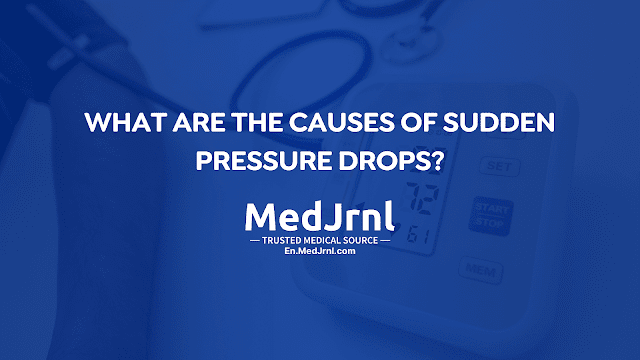This article discusses the causes of sudden low blood pressure and the medical conditions that may lead to severe drops and shock.
Causes of sudden pressure drops
The causes of a sudden drop in blood pressure may be due to a decrease in blood volume, the inability of the heart to pump blood efficiently, or severe expansion of the blood vessels.
Causes of sudden hypotension include:
Change body position
Orthostatic or postural hypotension may occur when a sudden change in body position occurs, such as standing up quickly from a sitting position or after lying down. For example, a person may feel a decrease in blood pressure when getting up suddenly after waking up from sleep.
Causes of postural hypotension include:
- Staying in bed for a long time.
- Drought.
- Use of medications, such as some blood pressure medications, diuretics, and tricyclic antidepressants.
- Pregnancy.
Sudden hypotension may also occur as a result of postural hypotension, which results from a disorder in the autonomic nervous system. It causes a decrease in pressure when changing the body position, such as getting up from a chair or bed.
The causes of sudden hypotension in this case are due to some neurodegenerative disorders, such as Parkinson's disease and Lewy body dementia, as well as diabetic neuropathy.
Eat the food
The causes of low blood pressure after eating are due to increased blood flow to the intestines to aid digestion. This temporarily reduces blood and oxygen reaching the brain, and the pressure drop usually occurs within 30 to 75 minutes of eating.
Older people, especially those suffering from Parkinson's disease, diabetes, and high blood pressure, are more susceptible to this condition.
Squeamishness
The causes of a sudden drop in blood pressure may be due to a severe allergic reaction to allergens. Which leads the body to produce a large amount of histamine, which causes the blood vessels to widen, and then the pressure drops.
Examples of allergens include:
- feed him.
- Drugs.
- Chemicals.
- Insect bites.
- Severe infection or septic shock
Septic shock is caused by sepsis, a severe bacterial infection that attacks the walls of small blood vessels; Which leads to fluid leakage from the blood into the surrounding tissues, causing a sharp drop in blood pressure.
Vasovagal attack
Vasovagal attack is one of the causes of sudden, recurrent hypotension, and occurs as a result of a defect in the vagus nerve, which transmits nerve signals from the body’s organs to the brain. Which leads to a sharp drop in blood pressure and heart rate and fainting.
Vasovagal syncope is caused by an overreaction to certain stimuli, such as:
- Seeing blood.
- Drawing blood samples.
- Extreme emotional distress.
Vascular syncope is one of the causes of sudden hypotension in young people, as it represents 85% of fainting cases in people under 40 years of age.
Nervously mediated pressure drop
One of the reasons for a sudden drop in blood pressure in children as well as adults may be standing in one position for long periods, as this is due to an imbalance between the nervous system and other organs of the body.
Neurologically mediated hypotension can also occur as a result of exposure to fear, panic, or intense emotional stress.
Hypovolemic shock
Hypovolemic shock occurs when the body loses more than 20% of its blood volume; Which leads to the inability of the heart to pump enough blood to the body’s organs, which is one of the most common causes of sudden hypotension, and results from exposure to many health problems, such as:
- Severe dehydration.
- Severe internal or external bleeding.
- Excessive use of diuretics.
- Fluid loss due to diarrhea and vomiting.
Cardiogenic shock
Cardiogenic shock occurs due to the inability of the heart to work efficiently as a result of cardiovascular problems, and may be accompanied by a decrease in heart rate and cold and dry skin and extremities.
Causes of sudden hypotension resulting from heart disease include:
- Congestive heart failure.
- Coronary artery disease.
- Myocardial infarction.
- Heart valve disease, especially aortic stenosis.
Obstructive shock
Obstructive shock can be one of the causes of a sudden drop in blood pressure, in which a blockage occurs in the blood circulation, resulting in the heart becoming less efficient in pumping blood or preventing blood flow, as in the case of a pulmonary embolism.
Suspension pressure drop
Supine hypotension syndrome is one of the causes of a sudden drop in blood pressure in a pregnant woman in the last months when lying on her back, as the weight of the uterus puts pressure on the inferior vena cava, which reduces blood flow to the heart, and then to the rest of the body. Symptoms may range from mild symptoms, such as nausea, to serious symptoms, such as shock and possibly death.
